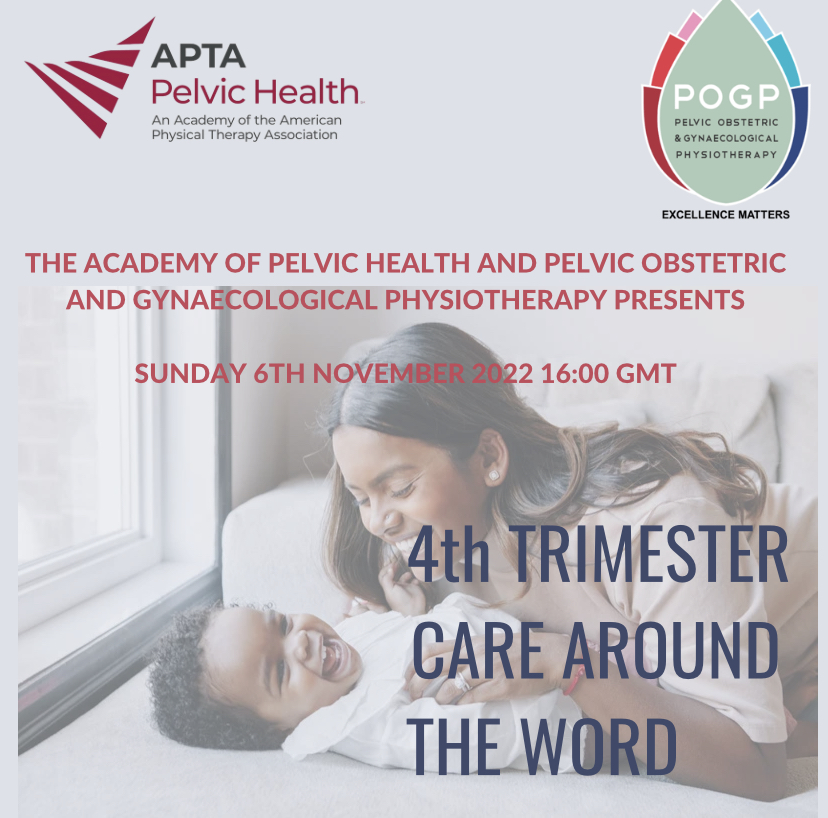4th Trimester Care Around the World - Part 2
29 October 2022
(Last updated: 14 Jan 2023 17:15)
12.00 pm - 14.00 pm ET / 16.00 GMT
Join us for Part 2 of our discussion on 4th-trimester care around the world! This is a highly requested sequel to a unique event co-sponsored by the Academy of Pelvic Health Physical Therapy and the Pelvic, Obstetric, and Gynaecological Physiotherapy organizations as they host a roundtable of experts to discuss postpartum care across the globe. This will be a two-hour webinar held on Sunday, November 6th from noon until 2 PM Eastern time / 16.00 - 18:00 GMT.
The recording will be shared on the POGP website for those that can't make it live!
Watch it here
This will be hosted by Rebeca Segraves, APHPT volunteer, and Gráinne Donnelly, POGP volunteer, as they facilitate roundtable discussions with international experts to help advance maternal care through thoughtful discourse and collaboration. Each attendee will be informed of common 4th trimester standards of care around the world and how they are implemented, barriers to maternal care and how these may be addressed, and how they may assist in advancing postpartum care in their area.
The NHS Long Term Plan committed that “all women will have access to multidisciplinary pelvic health clinics and pathways across England” by March 2024. Further, in July 2020, the Independent Medicines and Medical Devices Safety (IMMDS) Review recommended that “Conservative measures must be offered to women before surgery. We have heard that specialist pelvic floor physiotherapy cannot match the current demand. The service commissioner should identify gaps in the workforce; a co-ordinated strategy can then be developed to remedy the gap.”
NHS England and NHS Improvement (NHSE/I) has therefore committed to the phased implementation of Perinatal Pelvic Health Services (PPHS). These services will lead local delivery of the national ambition to improve the prevention, identification, and treatment of ‘mild to moderate’ pelvic floor dysfunction following birth; and ultimately reduce the number of women living with pelvic floor dysfunction in England postnatally and in later life, and the associated personal, societal and financial cost.
The overarching responsibilities of these services will be to: 1. Embed evidence-based practice in antenatal, intrapartum and postnatal care to prevent and mitigate pelvic floor dysfunction resulting from pregnancy and childbirth. 2. Improve the rate of identification of pelvic floor issues antenatally and postnatally. 3. Ensure timely access to NICE-recommended treatment for common pelvic health issues antenatally and postnatally.
Frimley and Lancashire & South Cumbria (L&SC) submitted collaborative bids to NHSE/I to become Early Implementer Systems in January 2021 and were delighted to be successful in their bids to develop and improve pelvic health services for L&SC and for Frimley
In Summer 2021 POGP members, Catherine Ross, Jenny Sheppard & Suzanne Willacy were appointed as their Clinical Project Leads and their presentation will share insights in their journey so far for this project.
Find out more
Register

View other News